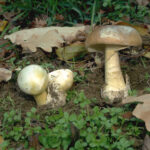
The Food Safety Information Council today issued food safety advice for consumers about bush fires and power outages.
Lydia Buchtmann, Council Communication Director, said that they have been receiving consumer enquiries about what to do with food during this emergency.
‘Our thoughts go out to those affected by the fire emergency. One of the dangers of a fire can be toxic fumes from burning materials. Chemicals used to fight the fire can also contain toxic materials. The heat from a fire can cause bacteria in food to multiply, ‘ Ms Buchtmann said.
‘Here are some key food safety points after a fire:
- throw out any food that has been near a fire, including food in cans and jars even if it appears ok
- any raw food, or food in packaging such as cardboard, plastic wrap, screw-topped jars and bottles should also be thrown out
- throw out food from a refrigerator as the refrigerator seal isn’t airtight, fumes can get inside
- wash cooking utensils exposed to fire-fighting chemicals in soapy hot water, then sanitise in 1 tablespoon of chlorine bleach per 2 litres of water and rinse.
- When you dispose of food, wrap it in newspaper and place in the rubbish bin. A small volume of food may be safely buried.
- Where larger quantities have to be disposed of your local government’s environmental health officer should be contacted. Without correct disposal, fly breeding, animal and pest scavenging may result and increase the risk of the spread of infectious diseases.
‘If your power has gone out your food will remain safe in your refrigerator for 2 hours. If it has been more than 4 hours, throw the food out. Don’t open the fridge door during the power cut, unless necessary. The best option is to keep the refrigerated foods as cold as possible by not opening the door unless necessary to remove food to eat or check the temperature after 2 hours. or place items in the freezer. If this is not possible:
- Remove ice bricks from the freezer and place in an esky.
- Remove all meats, poultry, dairy and potentially hazardous food (for example dips, pâté, ham, prepared and cooked food) from the refrigerator and place in an cooler with frozen bricks or gel packs.
- Salted butter, margarine and hard cheeses will remain safe at room temperature.
- Place the ice or ice bricks throughout the stored food to ensure an even temperature. Make sure the lid of the cooler has a good seal.
- If the temperature of the food stored in an cooler or refrigerator reaches more than 5 °C for less than 2 hours you should find alternative refrigeration at less than 5 °C or, if possible, freeze or use immediately.
- Food stored in a refrigerator or esky at more than 5 °C for 4 hours or more should be thrown out.
- Freezers that are in good condition and operate at minus 15 °C or below can keep foods at safe temperatures for between 1 and 2 days. If the freezer door is kept shut, a full freezer can keep food chilled for up to 48 hours, while a half full freezer can be kept food chilled for 24 hours.
- It is important that the doors of freezers are not opened unless necessary. Opening and closing the doors will reduce the time the contents will remain at safe temperatures.
- Foods that have partly defrosted or defrosted but remain very cold (5 °C or less) can be refrozen. Remember that some food types, for example ice cream which will thaw other foods defrost. Although there is no safety issue, some foods become icy or their texture will be damaged when refrozen and may not be usable after defrosting and refreezing.
- If your food has been in a freezer where the temperature has reached more than 5 °C for more than 2 hours, but less than 4 hours, it should be consumed immediately.
- Food stored in a freezer for more than 4 hours at more than 5 °C should be thrown out.
‘Also remember to throw out food that was being cooked when the power failed if cooking cannot be completed properly within 2 hours. If food is already properly cooked, eat it within 2 hours or throw it out,’ Ms Buchtmann concluded
Media contact Lydia Buchtmann 0407626688
For additional information in your state or territory see Food Standards Australia New Zealand Food Safety in Emergencies



